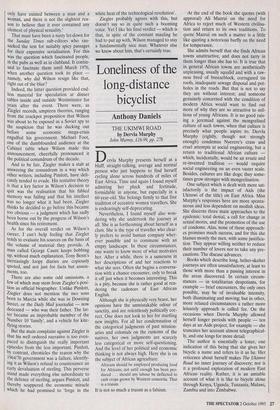Loneliness of the long-distance bicyclist
Anthony Daniels
THE UKIMWI ROAD by Dervla Murphy John Murray, £16.99, pp. 278 Dervla Murphy presents herself as a bluff, straight-talking, average and normal person who just happens to find herself cycling alone across hundreds of miles of East Africa. Time and again I found myself admiring her pluck and fortitude, formidable in anyone, but especially in a 60-year-old. She belongs firmly to that fine tradition of eccentric women travellers. She is endearingly self-deprecating.
Nevertheless, I found myself also won- dering why she undertook the journey at all. She is as forthcoming about herself as a clam. She is the type of traveller who clear- ly prefers to avoid human company wher- ever possible and to commune with an empty landscape. In these circumstances, one wants to know more of what motivates her. After a while, there is a sameness in her descriptions of and her reactions to what she sees. Often she begins a conversa- tion with a chance encounter, only to break it off just when it becomes interesting. This is a pity, because she is rather good at ren- dering the cadences of East African English. Although she is physically very brave, her opinions have the unmistakable odour of sanctity, and are relentlessly politically cor- rect. One does not look to her for startling new insights. For all her condemnation of the categorical judgments of past mission- aries and colonials on the customs of the natives, her own judgments are scarcely less categorical or more self-questioning. And the level of her political and economic thinking is not always high. Here she is on the subject of African agriculture: Africans should be employed producing food for Africans; not until enough has been pro- duced . . . should any labour be deflected to cash crops grown by Western consortia. That is a truism.
It is not so much a truism as a falsism. At the end of the book she quotes (with approval) Ali Mazrui on the need for Africa to reject much of Western civilisa- tion and return to its own traditions. To quote Mazrui on such a matter is a little like quoting a notorious barfly on the need for temperance.
She admits herself that she finds African towns unattractive, and does not tarty in them longer than she has to. It is true that in general African towns are aesthetically unpleasing, usually squalid and with a raw- ness bred of breezeblock, corrugated tin roofs, inadequate sewage disposal and pot- holes in the roads. But that is not to say they are without interest; and someone genuinely concerned with the condition of modern Africa would want to find out more of why they are so attractive to mil- lions of young Africans. It is no good rais- ing a jeremiad against the mongrelised culture of such towns, when that culture is precisely what people aspire to. Dervla Murphy (rightly, though not strongly enough) condemns Nyerere's crass and cruel attempts at social engineering, but a return to traditional African culture — which, incidentally, would be an ersatz and re-invented tradition — would require social engineering on an even vaster scale. Besides, cultures are like dogs; they some- times grow stronger with mongrelisation.
One subject which is dealt with more sat- isfactorily is the impact of Aids (the Ukimwi of the title) on East Africa. Miss Murphy's responses here are more sponta- neous and less dependent on modish ideas. She discerns three main approaches to the epidemic: total denial, a call for change in sexual mores, and the promotion of the use of condoms. Alas, none of these approach- es promises much success, and for this she blames mostly the men, with some justifica- tion. They appear willing neither to reduce their number of lovers nor to take any pre- cautions. The disease advances.
Books which describe long, helter-skelter journeys are often unsatisfactory, at least to those with more than a passing interest in the areas discovered. In certain circum- stances — in totalitarian despotisms, for example — brief encounters, the only ones possible, may be of invaluable intensity, both illuminating and moving; but in other, more relaxed circumstances a rather more leisurely approach is called for. On the occasions when Dervla Murphy allowed herself longer periods with people — ten days at an Aids project, for example — she truncates her account almost telegraphical- ly, and one longs for more detail.
The author is essentially a loner, one indication of this being that she gives her bicycle a name and refers to it as he. Her reticence about herself makes The Ulcimwi Road no inner journey of discovery; nor is it a profound exploration of modern East African reality. Rather, it is an amiable account of what it is like to bicycle alone through Kenya, Uganda, Tanzania, Malawi, Zambia and into Zimbabwe.


















































 Previous page
Previous page